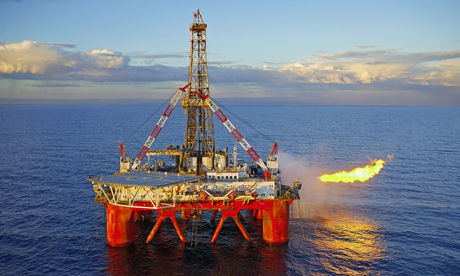Norway's sovereign wealth fund: £259bn and growing
• Oil-based fund to take a role in green issues
• Human rights and climate change on investment agenda
-

- guardian.co.uk, Sunday 20 September 2009 16.19 BST
- Article history
Each morning Yngve Slyngstad heads to his office at the top floor of Norway's central bank and checks how the investments of the world's largest sovereign wealth fund outside the Middle East are doing. At £259bn, they have never been higher and could easily cover the UK's £175bn budget deficit.

Although the Norwegian fund is largely based in oil and gas, it is likely to expand into property and green energy. Photograph: Robert Garvey/Corbis
The fund, in which Norway saves its oil and gas revenues from the North Sea, has become so large that it now owns more than 1% of the world's shares, is Europe's biggest equity investor and speaks for 1.7% of all listed European companies. Recent rises are the result of Slyngstad buying $175bn (£107.5bn) worth of equities when world markets crashed earlier this year, following the Norwegian government's decision to increase the share of equities in the fund from 40% to 60%.
"It was good timing," says Slyngstad, the fund's goatee-bearded chief executive, adding that he never thought the fund would ever reach that value. "A few years back, we thought the fund would stop somewhere at that level [of 1%]. Since then oil prices have been consistently higher and, aside from the recent dip, [in the past ten years] equity markets [have increased in value]," he says.
The oil fund is very present in the UK. Its largest equity holding is in Shell (£1.789bn), followed by HSBC (£1.738bn, third place), BP (£1.698bn, fourth) and Vodafone (£1.15bn, seventh). The fund also holds £8.3bn in UK bonds – its most important bond holding.
The fund's exposure to the UK will soon increase further, as Slyngstad is planning to invest into the UK property market in the coming months. "The UK is the first [property] market we will go into," he says. "I will be surprised if we are not present by summer next year."
He adds: "Our presence will be probably take the shape of a joint-venture with a real-estate company." Talks with major property companies in the UK are ongoing, but Slyngstad isn't naming names.
Another plan for the oil fund is to play a more activist role in green issues – paradoxically for a fund based on oil and gas revenues – by pushing climate change on to the agenda of the energy and utility companies where it holds stakes. Leaders at Shell and BP might therefore expect to receive the oil fund's list of investor expectations on climate change in the mail soon. It includes analysing the impact climate change has on the companies' activities, measuring the greenhouse gases they emit and setting clear targets for reducing them. If companies do not comply, Slyngstad plans action: "We may work with others to change the boards' composition, put the issue on the agenda of the general assembly, make shareholders' proposals."
Why the focus on climate change? "We are an investor with a 30-year horizon," he explains. "We think that in the long run the profitability of companies will be affected by how these bigger issues are handled. And we are a universal owner, in the sense that we owe stakes in nearly 8,000 companies. The action in one company, which may be profitable in one company ... may affect the profitability of other companies in the future. This is in straight in line with maximising the return of the fund."
But it is also a political decision. Slyngstad reports back to the Norwegian finance ministry, which has ultimate responsibility for the fund, and the government is keen to use the fund's financial power to play a greater international role on fighting climate change – it pledged last year to donate $1bn to Brazil to stop the deforestation of the Amazon.
Another decision up to the government is the fund's ethical stance. The oil fund does not invest, among other things, in companies involved in child labour, violation of human rights, or the production of nuclear, chemical or biological weapons. Nearly 30 firms have been kicked out so far, most recently in September, when the fund sold its shares in Israeli group Elbit as it provided a surveillance system for the separation wall in the West Bank. In 2006 the fund disinvested from US retail giant Wal-Mart because its labour policies, such as blocking employees' attempts to form unions or pressurising staff to work overtime without compensation, constituted an infringement of human rights.
If it was up to him, Slyngstad would rather not blacklist companies. He says: "Clearly we would rather engage with companies rather than exclude them because we can have much more impact on them."
His views may not have fallen on deaf ears at the ministry of finance. In March the oil fund for the first time put a company, Siemens, "under observation" rather than exclude it, for what it said was "gross and systematic corruption the group has been involved in over many years". It will only be excluded if "new cases of gross corruption [were] discovered".
This may be the beginning of a new trend at the powerful fund, where less exclusion and more engagement are the guiding principles.
The fund
Created in 1990, the Norwegian Government Pension Fund is the world's third-largest sovereign wealth fund, after the funds of Abu Dhabi and Saudi Arabia, according to the California-based Sovereign Wealth Fund Institute (this ranking, however, appears flexible: a 2007 UBS report puts the Norway fund in second place).
Commonly known as the oil fund, it invests the country's oil and gas income in stocks and bonds to save for future generations, when the hydrocarbons run out. Investments are made abroad to avoid overheating the economy.
Outside of crisis times, only 4% of the fund, the estimated long-term rate of return, is used in the state's national budget. The government made an exception this year, tapping into the oil fund to finance a package worth nearly 5% of gross domestic product to boost the economy.
The oil fund has become one of the most important issues of political debate in Norway. Although most parties agree to the 4% rule, the largest party in opposition, the populist Progress party, wants to spend more of the oil money for research and building infrastructure.

2 comments:
Good day !.
might , perhaps very interested to know how one can make real money .
There is no initial capital needed You may start to get income with as small sum of money as 20-100 dollars.
AimTrust is what you need
The firm represents an offshore structure with advanced asset management technologies in production and delivery of pipes for oil and gas.
Its head office is in Panama with offices around the world.
Do you want to become really rich in short time?
That`s your choice That`s what you wish in the long run!
I`m happy and lucky, I began to get income with the help of this company,
and I invite you to do the same. If it gets down to choose a correct companion who uses your savings in a right way - that`s it!.
I earn US$2,000 per day, and what I started with was a funny sum of 500 bucks!
It`s easy to join , just click this link http://kubufyqisy.freewebsitehosting.com/finibo.html
and lucky you`re! Let`s take our chance together to feel the smell of real money
Hello !.
You may , perhaps curious to know how one can make real money .
There is no initial capital needed You may commense earning with as small sum of money as 20-100 dollars.
AimTrust is what you thought of all the time
AimTrust represents an offshore structure with advanced asset management technologies in production and delivery of pipes for oil and gas.
Its head office is in Panama with affiliates around the world.
Do you want to become a happy investor?
That`s your chance That`s what you desire!
I feel good, I began to take up real money with the help of this company,
and I invite you to do the same. If it gets down to select a proper partner utilizes your money in a right way - that`s it!.
I earn US$2,000 per day, and my first deposit was 1 grand only!
It`s easy to get involved , just click this link http://efixemeb.dreamstation.com/gaqazeg.html
and lucky you`re! Let`s take our chance together to get rid of nastiness of the life
Post a Comment